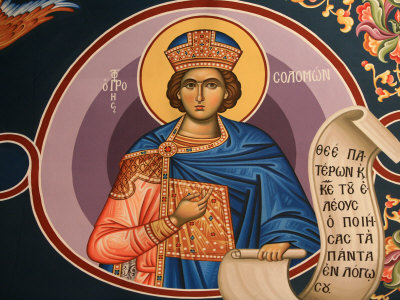A house of God built of living stones
 From the Commentary on the Gospel of John by Origen, Priest
From the Commentary on the Gospel of John by Origen, Priest
“But he spoke of the temple of his body.” When, therefore, Christ was raised from the dead, his disciples remembered that he said this, and they believed the Scripture and the word which Jesus had said. This refers to the statement that the Body of the Son is his temple. It may be asked whether this is to be taken in its plain sense, or whether we should try to connect each statement that is recorded about the temple, with the view we take about the Body of Jesus, whether the Body which he received from the Virgin, or that body of Christ which the Church is said to be, as we are said by the Apostle to be all members of His body. One may, on the one hand, suppose it to be hopeless to get everything that is said about the temple properly connected with the body, in whatever sense the body be taken, and one may have recourse to a simpler explanation, and say that the body (in either of these senses) is called the temple, because as the temple had the glory of God dwelling in it, so he who was the image and glory of God, the first-born of every creature, could rightly be called, in respect of his body or the Church, the temple containing the image.
The body is the Church, and we learn from Peter that it is a house of God, built of living stones, a spiritual house for a holy priesthood. Thus the son of David, who builds this house, is a type of Christ. He builds it when his wars are at an end, and a period of profound peace has arrived; he builds the temple for the glory of God in the Jerusalem on earth, so that worship may no longer be celebrated in a moveable erection like the tabernacle. Let us seek to find in the Church the truth of each statement made about the temple. If all Christ’s enemies are made the footstool of His feet, and Death, the last enemy, is destroyed, then there will be the most perfect peace. Christ will be Solomon, which means Peaceful, and the prophecy will find its fulfilment in Him, which says, “With those who hated peace I was peaceful.”
And then each of the living stones will be, according to the work of his life here, a stone of that temple, one, at the foundation, an apostle or a prophet, bearing those placed upon him, and another, after those in the foundation, and supported by the Apostles, will himself, with the Apostles, help to bear those in more need. One will be a stone of the inmost parts, where the ark is, and the cherubim, and the mercy-seat; another will be on the outer wall, and another even outside the outer wall of the levites and priests, a stone of the altar of whole burnt offerings. And the management and service of these things will be entrusted to holy powers, angels of God, being, respectively, lordships, thrones, dominions, or powers; and there will be others subject to these, typified by three thousand six hundred chief officers, who were appointed over the works of Solomon, and the seventy thousand of those who bore burdens, and the eighty thousand stone-cutters in the mountain, who wrought in the work, and prepared the stones and the wood.
